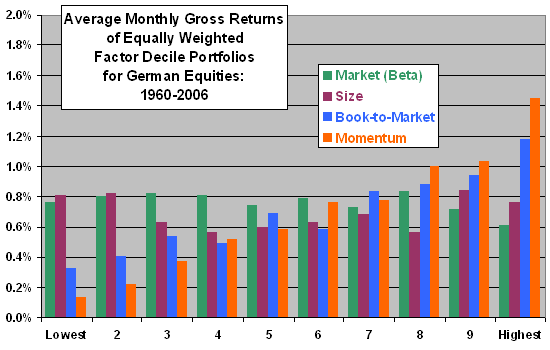Studies of the U.S. stock market indicate that some factors and indicators may have predictive power for future returns. Do these findings consistently translate to other large equity markets? In the July 2010 version of their paper entitled “The Cross-Section of German Stock Returns: New Data and New Evidence”, Sabine Artmann, Philipp Finter, Alexander Kempf, Stefan Koch and Erik Theissen apply a new set of single-sorted and double-sorted factor portfolios based on market beta, size, book-to-market ratio and momentum to test for beta effect, size effect, value premium and momentum in the German equity market. In the July 2010 version of their paper entitled “The Impact of Investor Sentiment on the German Stock Market”, Philipp Finter, Alexandra Niessen-Ruenzi and Stefan Ruenzi test the predictive power of a composite sentiment measure combining consumer confidence, net equity mutual funds flow, put-call ratio, aggregate trading volume, initial public offering (IPO) returns, number of IPOs and aggregate equity-to-debt ratio of new issues. Using data for 955 non-financial German firms for which sufficient data is available during the period 1960-2006 for the factor portfolios and 1993-2006 for the sentiment measure, these studies find that:
“The Cross-Section of German Stock Returns: New Data and New Evidence” informs beliefs as follows:
- There is no basis for belief that stock beta or firm size predict future returns.
- There is some basis for belief that book-to-market ratio predicts future returns.
- There is strong basis for belief that momentum predicts future returns.
- The best (worst) performance among 96 double-sorted quartile portfolios comes from that comprised of stocks with the highest (lowest) momentum and highest (lowest) book-to-market ratio, generating an average monthly gross return of 1.33% (-0.10%). The associated hedge portfolio gross monthly spread of 1.43% translates to an annualized return of 17%.
The following chart, constructed from data in the paper, summarizes average monthly gross returns for equally weighted decile portfolios of German stocks based on market (beta), size, book-to-market and momentum factors over the entire sample period. Market, size, and book-to-market portfolios are reformed at the end of June of each year and held for 12 months, while momentum portfolios are reformed monthly based on return over the past 11 months lagged by one month. Results suggest that momentum has the strongest, most consistent predictive power, followed by book-to-market ratio, while the market beta and size effects are absent.

“The Impact of Investor Sentiment on the German Stock Market” informs beliefs as follows:
- Investor sentiment has no predictive power for overall stock market returns.
- Sentiment has weak predictive power for the difference in future returns between stocks that are arguably sentiment-sensitive (high idiosyncratic volatility, small average trade size, young, small, unprofitable, no dividend) and stocks that are arguably sentiment-insensitive.
- This effect derives mostly from relative undervaluation of sentiment-sensitive stocks after periods of very low sentiment (consistent with investors reacting more strongly to bad news than good news).
- Sentiment-sensitive stocks underperform sentiment-insensitive stocks for a few months after instances of very low sentiment, but then outperform in the following quarters.
- Findings are consistent with the hypothesis that retail investors are more emotional than institutional investors and the fact that retail investing comprises a relatively small fraction of trading in German stocks.
Neither study considers trading frictions in portfolio formation and adjustment.
In summary, evidence from German stocks supports belief in the pervasiveness of a momentum effect and perhaps a value premium, but not market beta and size effects. Any sentiment effect is likely weak, specific to susceptible stocks and concentrated in intervals after very low sentiment.
Data snooping bias is a suspect when cross-market findings conflict.